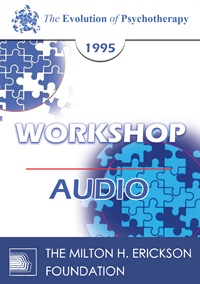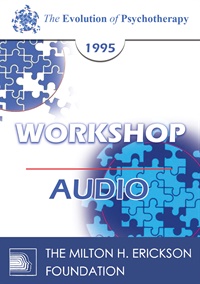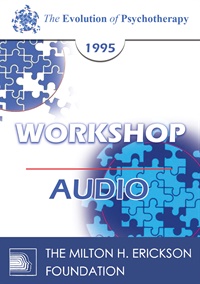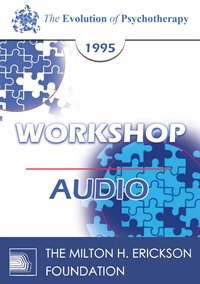
- Average Rating:
- Not yet rated
- Topic Areas:
- Keynotes | Psychotherapy | Therapeutic Relationship | Therapist Development
- Categories:
- Evolution of Psychotherapy | Evolution of Psychotherapy 1995
- Faculty:
- Gloria Steinem
- Duration:
- 1 Hour 23 Minutes
- Format:
- Audio Only
- Original Program Date:
- Dec 17, 1995
- Short Description:
- This address describes the interaction of a client and therapist and how psychotherapy encourages growth.
- Price:
- $15.00 - Base Price

- Average Rating:
- Not yet rated
- Topic Areas:
- Topical Panels | Psychotherapy | Therapist Development | Training
- Categories:
- Evolution of Psychotherapy | Evolution of Psychotherapy 1995
- Faculty:
- Mary Goulding, MSW | James F. Masterson, MD | Joseph Wolpe, M.D. | Jeffrey Zeig, PhD
- Course Levels:
- Master Degree or Higher in Health-Related Field
- Duration:
- 1:03:57
- Format:
- Audio Only
- Original Program Date:
- Dec 15, 1995
- Short Description:
- A panel of experts discuss their viewpoints on the given topic.
- Price:
- $15.00 - Base Price

- Average Rating:
- Not yet rated
- Topic Areas:
- Topical Panels | Psychotherapy | Therapist Development
- Categories:
- Evolution of Psychotherapy | Evolution of Psychotherapy 1995
- Faculty:
- Jay Haley, MA | Alexander Lowen, MD | Olga Silverstein, MSW | Joseph Wolpe, M.D.
- Duration:
- 57 Minutes
- Format:
- Audio Only
- Original Program Date:
- Dec 15, 1995
- Short Description:
- A panel of experts discuss their viewpoints on the given topic.
- Price:
- $15.00 - Base Price

- Average Rating:
- Not yet rated
- Topic Areas:
- Topical Panels | Homework | Therapist Development | Psychotherapy
- Categories:
- Evolution of Psychotherapy | Evolution of Psychotherapy 1995
- Faculty:
- Claudia Black, PhD | Jay Haley, MA | Arnold Lazarus, Ph.D. | Joseph LoPiccolo, PhD
- Duration:
- 57 Minutes
- Format:
- Audio Only
- Original Program Date:
- Dec 16, 1995
- Short Description:
- Panel 13 from the Evolution of Psychotherapy 1995 - Homework Assignments Featuring Claudia Black, Ph.D.; Jay Haley, M.A.; Arnold Lazarus, Ph.D.; and Joseph LoPiccolo, Ph.D. Moderated by Bernhard Trenkle, Dipl. Psych.
- Price:
- $15.00 - Base Price

- Average Rating:
- Not yet rated
- Topic Areas:
- Topical Panels | Therapeutic Relationship | Therapist Development | Psychotherapy
- Categories:
- Evolution of Psychotherapy | Evolution of Psychotherapy 1995
- Faculty:
- William Glasser, MD | Lynn Hoffman, ACSW | Ernest Rossi, PhD | Joseph Wolpe, M.D.
- Duration:
- 54 Minutes
- Format:
- Audio Only
- Original Program Date:
- Dec 16, 1995
- Short Description:
- Panel 14 from the Evolution of Psychotherapy 1995 - Role of the Therapist / Role of the Client Featuring William Glasser, M.D.; Lynn Hoffman, A.C.S.W.; Ernest Rossi, Ph.D.; and Joseph Wolpe, M.D. Moderated by Betty Alice Erickson, MS.
- Price:
- $15.00 - Base Price

- Average Rating:
- Not yet rated
- Topic Areas:
- Topical Panels | Law & Ethics | Psychotherapy | Therapist Development
- Categories:
- Evolution of Psychotherapy | Evolution of Psychotherapy 1995
- Faculty:
- Cloe Madanes, HDL, LIC | Margaret Singer, PhD | Thomas Szasz, MD | Jeffrey Zeig, PhD
- Course Levels:
- Master Degree or Higher in Health-Related Field
- Duration:
- 59:33
- Format:
- Audio Only
- Original Program Date:
- Dec 16, 1995
- Short Description:
- Panel 16 from the Evolution of Psychotherapy 1995 - Key Ethical Considerations Featuring Cloe Madanes, Lic. Psychol.; Margaret Singer, Ph.D.; Thomas Szasz, M.D.; and Jeffrey K. Zeig, Ph.D. Moderated by Bernhard Trenkle, Dipl. Psych.
- Price:
- $15.00 - Base Price

- Average Rating:
- Not yet rated
- Topic Areas:
- Workshops | Family Therapy | Supervision | Therapist Development
- Categories:
- Evolution of Psychotherapy | Evolution of Psychotherapy 1995
- Faculty:
- Salvador Minuchin, MD
- Duration:
- 2 Hours
- Format:
- Audio Only
- Original Program Date:
- Dec 13, 1995
- Short Description:
- Minuchin will supervise a therapist who brings a live family or a videotape of a family therapy session.
- Price:
- $15.00 - Base Price

- Average Rating:
- Not yet rated
- Topic Areas:
- Workshops | Psychotherapy | Therapist Development
- Categories:
- Evolution of Psychotherapy | Evolution of Psychotherapy 1995
- Faculty:
- Arnold Lazarus, Ph.D.
- Duration:
- 2 Hours 34 Minutes
- Format:
- Audio Only
- Original Program Date:
- Dec 13, 1995
- Short Description:
- A consistent, testable theory can permit the importation of effective techniques, not theories, on patients. Knowing when to apply a specific technique and how to enhance compliance will be stressed.
- Price:
- $15.00 - Base Price

- Average Rating:
- Not yet rated
- Topic Areas:
- Workshops | Psychotherapy | Therapist Development
- Categories:
- Evolution of Psychotherapy | Evolution of Psychotherapy 1995
- Faculty:
- James F. Masterson, MD
- Duration:
- 2 Hours 35 Minutes
- Format:
- Audio Only
- Original Program Date:
- Dec 13, 1995
- Short Description:
- The development of the capacities of the healthy real self is described along with the impairments in these capacities that ensue in the Disorders of the Self. A diagnostic system based on the Disorders of the Self is presented, its conceptual basis is explained, and it is compared with DSM IV. A central triadic psychodynamic theme of these disorders, i.e., self-activation leads to depression which leads to defense, is described.
- Price:
- $15.00 - Base Price

- Average Rating:
- Not yet rated
- Topic Areas:
- Workshops | Psychotherapy | Therapist Development
- Categories:
- Evolution of Psychotherapy | Evolution of Psychotherapy 1995
- Faculty:
- Paul Watzlawick, PhD
- Duration:
- 2 Hours 36 Minutes
- Format:
- Audio Only
- Original Program Date:
- Dec 13, 1995
- Short Description:
- Human problems can be seen as "games without end; " that is, as recurring behaviors based on the continuous application of rigid rules, but devoid of rules for the change of these rules. What are such "meta-rules" and how can they be introduced?
- Price:
- $15.00 - Base Price
Please wait ...

